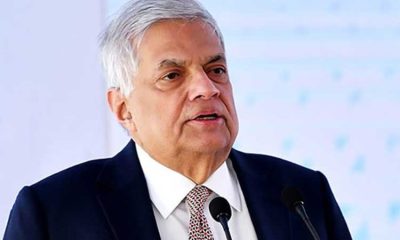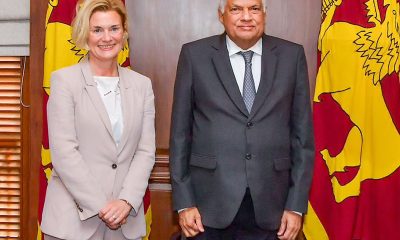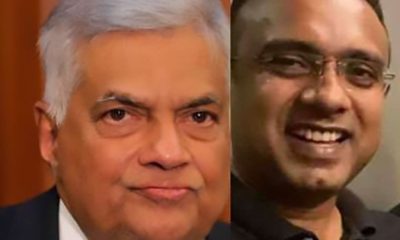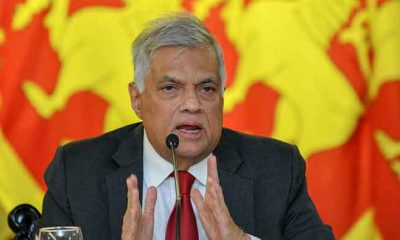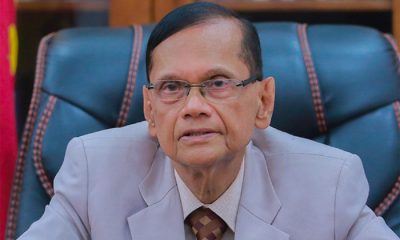Editorial
Diana Gamage and Ajahn Brahm

Tourism State Minister Diana Gamage, whose eligibility to remain a Member of Parliament has remained an open question for a long time now since she ceased her allegiance with the Samagi Jana Balavegaya (SJB) on whose National List she entered the legislature in 2020, was back in the news last week. The Appeal Court determination of an action challenging her continuance as an MP, that was due to be delivered on Tuesday, has now been postponed for July 25 by a two-judge bench. This made front page news nationally.
No reason for the delay has been publicly adduced. While it is not uncommon for the courts to sometimes reserve judgment sine die, it is less frequent for dates specified for delivery of such orders being further delayed. However that be, those anxious to know – and there are many such – whether a second glamorous lady MP was being ejected from the legislature (well know actress Geetha Kumarasinghe was the first) will now have to wait longer to get an answer.
Gamage, once called Princess Diana in parliament by her boss Minister Harin Fernando, has been a controversial figure. When UNP leader Ranil Wickremesinghe and his deputy, Sajith Premadasa, parted company before the last parliamentary election, the then unrecognized SJB had to acquire an already recognized party to field its candidates at those hustings.
This was provided by Gamage and her husband, Senaka de Silva, a retired military officer who was a key ally of General Sarath Fonseka when he ran for president. No doubt Gamage’s appointment to the House on the SJB National List and her appointment as Deputy Secretary or that party was part of that arrangement. As recently as last week, SJB General Secretary Ranjith Madduma Bandara claimed in parliament that Gamage does not hold party office citing the Election Commission’s website as evidence.
Madduma Bandara went so far as saying that the SJB made a mistake in acquiring a party “from people who make faked documents.” He said that buyers examine the pedigree “even before buying a dog.” But apart from admitting the “mistake,” he didn’t elaborate on his party’s failure if not culpability. However that be, the public are entitled to know in what manner the continuing problem of the long list of parties officially recognized by the election authorities is going to be resolved once and for all. There is no escaping the reality that the recognition of factually non-existent ‘ghost’ parties enable shady arrangements that have been made time and again for opportunistic reasons.
The SJB today no doubt wishes to see the back of Diana Gamage who claims “ownership” of that party not only from its list of office bearers but from parliament as well. Although there are provisions in the law to disqualify MPs who had entered the legislature under the proportional representation system from continuing to sit and vote in parliament after being expelled by their parties, this provision has not been successfully invoked for a very long time. The reason for this has been attributed to a past judgment of the Sarath Silva Supreme Court.
Former President Gotabaya Rajapaksa went through a long drawn process to renounce his U.S. citizenship to successfully run for president in November 2019. Given the way events played out and the difficulty he had in finding a permanent domicile after his unceremonious departure from office last year, he may well be regretting that decision or even enjoying that “one crowded hour of glorious fame” rather than an age without a name. In this case though he did have a long tenure as a war-winning Defence Secretary.
GR eventually returned home to the lavish pension and perquisites this bankrupt country accords its past rulers. There have been recent reports that Rajapaksa has now been assigned a second government bungalow, previously used by the foreign minister as his official residence. This was because the first at Malalasekera Mawatha was deemed “too noisy.” The aragalaya did get rid of Gotabaya and Mahinda Rajapaksa, but the much yearned for system change was not to be. Business continues as usual as far as our politicians are concerned.
The headline for this commentary was purely applied to describe the content of this editorial and not compare two personalities. There obviously can be no comparison between the two personalities named. Ajahn Brahm is a highly accomplished Buddhaputra and this country was privileged to host him for nine days recently. His visit gave boundless joy to thousands of Buddhists able to benefit from both his wisdom and his presence. The spot of dung so often polluting the pot of milk in this country unfortunately turned up when Ajahn’s departure for Australia via Singapore was delayed for as long as 12 hours. This was as a result of the anxiety of officials to stooge political panjandrums at the expense of looking after the venerable monk.
His reaction to the incident over which the president is reported to have ordered an inquiry was typical of the bigness of the man. He didn’t want fault finding or punishment imposed on whoever culpable and advised focus on what really matters. We are sure that Ajahn did not seek VIP lounge facilities or privileges for himself. These were probably arranged without his knowledge. If he was not in the VIP lounge and not at the mercy of those responsible for his misadventure, he would most probably have not missed his flight. There are many lessons for all of us to learn from Ajahn Brahm. Among these are the spirit of generosity he has demonstrated and the ability not to dwell on irritants that are past.
Editorial
Ensure safety of COPF Chairman

Saturday 8th June, 2024
It was with shock and dismay that we received the news about death threats to COPF (Committee on Public Finance) Chairman Dr. Harsha de Silva over the ongoing parliamentary probe into the on-arrival visa scam. Dr. de Silva yesterday told Speaker Mahinda Yapa Abeywardena, in Parliament, that he was facing death threats and intimidation, and it was incumbent upon Parliament to ensure his safety. He stopped short of naming names, but revealed that some ruling party MPs were among those who had ganged up against him. The Speaker only said there had been no complaint, and he would look into the matter.
The SLPP-UNP government has been doing everything in its power to have all parliamentary committees under its thumb. The COPE (Committee on Public Enterprises), which once helped restore public faith in the legislature by exposing state sector corruption, has now become a mere appendage of the incumbent regime, thanks to the appointment of SLPP MP Rohitha Abeygunawardena as its Chairman. The SLPP-UNP combine also tried to oust COPF Chairman Dr. de Silva, but in vain. However, it knows more than one way to shoe a horse.
The COPF, under Dr. de Silva’s chairmanship, has been a thorn in the side of the government, which is struggling to cover up numerous corrupt deals. Dr. de Silva yesterday told Parliament that he found it extremely difficult to function as the COPF head due to severe resource constraints his committee was facing; he himself had to pay the salaries of some of his staff members besides burning the midnight oil.
The sheer workload he had to cope with as the COPF chief had taken its toll on his health, he said, informing the Speaker that he was at the end of his tether, and at times thought of resigning from the COPF. This is exactly what the government wants him to do; resource squeezes and threats are aimed at making him quit.
On 26 May, Dr. de Silva revealed, in an ‘X’ post, that the COPF had uncovered some vital information about the visa scam and it would reveal everything after its final meeting on the issue; the COPF was committed to exposing the truth behind the controversial tender, he added. In an editorial comment on 27 May, we warned him.
While thanking him for his bold stand, we pointed out that by making such a statement, he had thrown caution to the wind, and become a marked target, with the government making an all-out effort to delay the COPF investigation lest the truth should come out much to the detriment of its interests in this election year. Unfortunately, what was feared has come about; Dr. de Silva is complaining of death threats and government moves to strangulate the COPF financially to derail its investigations.
Dr. de Silva’s predicament exemplifies the fate that befalls the few good men and women in Parliament. It is hoped that all those who seek an end to the state sector corruption will rally behind Dr. de Silva, and bring pressure to bear on the government to ensure his safety. Let Dr. de Silva be urged to reveal the names of those who have issued threats, veiled or otherwise, to him and are trying to scuttle the COPF probes.
Editorial
Dead man walking!

Friday 7th June, 2024
The SLPP-UNP government is going hell for leather to make bad laws as if there were no tomorrow. It is abusing its parliamentary majority, which has been retained with the help of some crossovers, for that purpose. The Opposition, the media and trade unions are up in arms, and understandably so. The incumbent regime is a dead man walking; it is so desperate that it is capable of anything. Hence the need for it to be restrained.
The Electricity (Amendment) Bill (EAB) plunged Parliament into turmoil yesterday, but the government secured its passage. The Supreme Court (SC) determined the entire EAB inconsistent with the Constitution and recommended changes thereto. After unveiling the Bill, sometime ago, Minister of Power and Energy Kanchana Wijesekera hailed it as an excellent piece of legislation aimed at straightening up the power sector to serve the public interest better.
The SC determination left him with egg on his face. He reminded us of the proverbial curate who, while eating a stale egg, assured his host, a Bishop, that parts of it were excellent. Wijesekera’s egg, as it were, made Parliament stink yesterday, but he sought to please his masters by praising it as a silver bullet.
EAB should have been discarded and a new one drafted in consultation with all stakeholders. But the government is apparently driven by an ulterior motive; its aim is not to serve Sri Lanka’s interests but to look after those of some moneybags.
It is not uncommon for Bills to contain some flaws, which are rectified either before or during the committee stage. But there is something terribly wrong with draft Bills that are full of sections inconsistent with the Constitution. The drafters of EAB have demonstrated their sheer ignorance of the supreme law, and that they are not equal to the task of drafting Bills. If they had read the Constitution at least perfunctorily, they would not have drafted such a bad law.
Ignorant and incompetent, they do not deserve to be paid with public funds and must be sent back to law school. They must be summoned before Parliament and questioned on their serious lapses, which have caused public faith in the national legislature to diminish.
Curiously, the MPs who demand that judges, doctors, Central Bankers, and other public officials be summoned before Parliament have taken badly drafted Bills for granted. The power sector trade unions yesterday alleged that EAB was of Indian origin and geared towards furthering the interests of Adani Group at the expense of Sri Lanka.
Most critics of EAB are agreeable in principle to the need for power sector reforms; the Ceylon Electricity Board should be given a radical shake-up, and transformed into a modern organisation capable of providing a better service at a lower cost. They only asked the government to tread cautiously, consulting all stakeholders and taking action to ensure that the country’s interests prevailed over everything else. But the government was in a mighty hurry to steamroller the Bill through Parliament, making the Opposition ask whether it was doing so at the behest of some external forces involved in controversial power generation deals here.
What is passed by the current Parliament can be either amended or abolished by a future parliament in a constitutionally prescribed manner. But that does not mean that a government is free to pass bad laws, making the country enter into long-term agreements with powerful nations and their investors. It looks as if the SLPP-UNP regime did not care two hoots about the consequences of its actions.
Editorial
Modi Magic on the wane

Thursday 6th June, 2024
The outcome of India’s parliamentary election (2024) has led to a ‘perspective ambiguity’. Prime Minister Narendra Modi lost no time in declaring victory for the BJP-led NDA alliance, which secured 293 seats in the 543-member Parliament, but he must be a worried man. The BJP is short of 32 seats to form a government under its own steam; it has lost 63 seats or about 20% of its parliamentary strength. It had 303 seats in the previous Parliament, and that number has dropped to 240.
Modi has become the second Indian Prime Minister to win a third term. The first PM to do so was Jawaharlal Nehru. But Nehru won an outright majority in Parliament in 1962; Modi has had to depend on smaller parties in his alliance to retain his hold on power. Modi must be reeling from a sharp drop in his victory margin in his own constituency, Varanasi; it has decreased to 152,000 from 480,000 in 2019 whereas Modi’s bete noire, Rahul Gandhi, won Raebareli by a staggering 390,000 votes.
Modi, who reigned supreme with 303 seats in the previous Parliament, is now dependent on parties such as Nitish Kumar’s JD-U and Chandrababu Naidu’s TDP to form a government. He has had to lead an alliance of strange bedfellows. Both Kumar and Naidu were bitter critics of Modi. Kumar helped form the oppositional alliance, the INDIA bloc, before switching his allegiance to PM Modi. Naidu also closed ranks with the BJP in the run-up to the election. These politicians have been described as extremely ambitious and highly unpredictable, and whether Modi will be able to manage them and consolidate his grip on the NDA alliance remains to be seen. They will demand plum ministerial posts in return for their support. The TDP is said to be eyeing Transport and Health portfolios! That is the name of the game in coalition politics, where it is not uncommon for the tail to wag the dog, so to speak. These two political leaders are however not the only problem Modi will have to contend with. The next five years will feel like an eternity for PM Modi.
Nothing would have been more shocking for the BJP than its defeat in Uttar Pradesh’s Faizabad constituency, where the Ram Mandir has been built. Modi may have thought he would be able to win the Lok Sabha election hands down after the consecration of that temple, which became a centrepiece of the BJP’s election campaign. The BJP lost that seat to the Samajwadi Party! Modi must be disappointed that the Ram Mandir hype failed to trigger a massive wave of support for his party. This particular defeat signifies a massive setback for the BJP’s ethno-religious agenda.
Modi’s divisive election campaign failed to yield the desired result. The BJP’s failure to secure an outright majority could be attributed to a host of factors, some of them being the suppression of the Opposition, the arrogance of power, chronic unemployment, and the rising cost of living. The BJP also did not care to reimage itself in a positive light to attract the youth.
Modi will hereafter see the Congress-led INDIA bloc with 223 seats, in his rearview mirror. The Congress (99 seats) and its allies have eaten into the BJP support base considerably, but they have a long way to go before being able to capture power.
The bumpy ride ahead for the BJP-led coalition government to be formed may improve the INDIA bloc’s chances of bettering their electoral performance and turning the tables on the BJP and its allies in time to come. Modi will have a lot to worry about in his third term.


